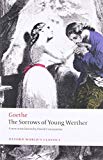
The Sorrows of Young Werther is a novel by Goethe. The novel is presented as a collection of letters from Werther to his friend Wilhelm and tells the story of Werther's visit to the village Wahlheim, where he falls in love with a woman named Lotte. Lotte is engaged to be married to an older man, Albert, whom she marries. Unwilling to murder, Werther's lovesick suffering drives him to suicide. The novel's subjective perspective and emotionality had a large impact on the Romantic movement and a generation of young people.
Already have an account? Log In Now